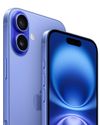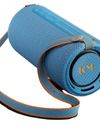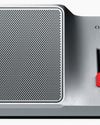
YOU WILL LEARN
How MEMS speaker technology uses silicon chips to create 'solid-state speakers' and headphones
Key fact
Creative Technology formerly Creative Labs - knows a thing or two about digital audio. Its SoundBlaster range of upgrade cards brought high-quality digital audio to PCs back in 1989, and dominated PC audio for almost 20 years. All Macs and PCs now have multi-channel sound built in, but the SoundBlaster name lives on with audio products such as the MEMS-based Aurvana earbuds.
Technology in the computer industry tends to change so quickly that it's often hard to keep up with all the latest developments. That's not the case in other industries, though - it took almost a century for electric cars to provide an alternative to the gas-guzzling internal combustion engine.
The somewhat stuffy hi-fi industry also tends to be quite resistant to change, using the same basic technology to produce headphones and speakers for almost 100 years (remember that a set of headphones is essentially a small pair of speakers that simply sit right over - or inside your ears).
Apple shook up the headphone market with the AirPods in 2016, creating an entirely new category of 'true wireless' headphones. But while Bluetooth headphones allow you to cut the cord and listen to music via a wireless connection, the technology that creates the sound inside those headphones hasn't really changed in a century.
This story is from the May 2024 edition of MacFormat UK.
Start your 7-day Magzter GOLD free trial to access thousands of curated premium stories, and 9,000+ magazines and newspapers.
Already a subscriber ? Sign In
This story is from the May 2024 edition of MacFormat UK.
Start your 7-day Magzter GOLD free trial to access thousands of curated premium stories, and 9,000+ magazines and newspapers.
Already a subscriber? Sign In

Mac hardware
We help to solve your hardware hassles, from interrupted upgrades to running diagnostics

Give your iPhone a whole new look in iOS 18
Make your iPhone uniquely you

iPhone 16
Apple Intelligence-ready smartphone for the rest of us

Apple Watch Series 10
10th anniversary Watch is now slimmer with an even bigger display

AirPods 4
Apple's most affordable AirPods remain a brilliant buy

We. HEAR Pro
Room-filling sound from this stylish wireless speaker

HiDock H1
An impressive 11-port AI audio dock for conferencers

Adobe Premiere Elements 2025
Create eye-catching videos for sharing on social media

Photoshop 2024
Your imagination is the limit with this AI-powered pixel creator

Wispr Flow
Bring the power of AI dictation to DMs, documents and Discord chats